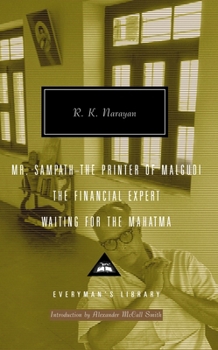Mr. Sampath-The Printer of Malgudi, the Financial Expert, Waiting for the Mahatma: Introduction by Alexander McCall Smith
Select Format
Select Condition 
Book Overview
"There are writers--Tolstoy and Henry James to name two--whom we hold in awe, writers--Turgenev and Chekhov--for whom we feel a personal affection, other writers whom we respect--Conrad for... This description may be from another edition of this product.
Format:Hardcover
Language:English
ISBN:1400044774
ISBN13:9781400044771
Release Date:March 2006
Publisher:Everyman's Library
Length:616 Pages
Weight:1.38 lbs.
Dimensions:1.4" x 5.5" x 8.2"
Customer Reviews
3 ratings
An Asian touch to a Western standard
Published by Thriftbooks.com User , 15 years ago
In many ways R.K. Narayan offers nothing more than a standard novel peopled with a standard cast of characters going through a standard story which develops along a standard plot. Is the only point of interest that the setting and the characters are Indian? Not quite. The cast includes the main character Srinivas, who edits a newspaper, and his sidekick Mr. Sampath, who prints it. We also meet Srinivas's wife and son, his landlord, a menagerie of neighbours and associates, and briefly Mr. Sampath's wife and family. Sampath is a more colorful fellow than the self-effacing and dependable Srinivas, but it is Srinivas who grows and develops through the novel, which except for a quick flashback at the start progresses very linearly from beginning to end. This is all very conventional, but there are unexpected twists. One of the supporting characters dies in the middle of the novel for no reason at all. It just happens. Another character falls in love, again for no reason at all--it just happens. Someone writes a relative for money and worries about the rebuke that will accompany the sum. Surprisingly a kind supportive word arrives instead with the cash. Life twists and veers off in unlooked for ways, which is a very Asian way of thinking. We shouldn't worry or bother about the accidents of life. "It was like bothering about a leaf on a torrent -- whether it was floating on its right side or wrong side" writes Narayan. Existence is what matters. Life goes on. Vincent Poirier, Tokyo
charming
Published by Thriftbooks.com User , 25 years ago
I bought this in Madras and that same night Chandra brought up Narayan in conversation -- raised in Mysore, brother to RK Laxman. Malgudi is not Mysore, though, but smaller, provincial, in the orbit of Madras -- perhaps some place like Chenglepat, Seshadri's birthplace. This book has a loose, whimsical mood to it. The twin protagonists, the unworldly editor and the worldly yet also idealistic printer, are wonderful. But the story isn't very tight. Short as it is, it reads as if written in installments. Interesting that it was published in London several years before India. I think that this book influenced Naipaul's House for Mr. Biswas -- Naipaul recognized his own father in Narayan's thwarted editor.
An underrated masterpiece
Published by Thriftbooks.com User , 25 years ago
Narayan's writing has immense natural charm and elegance: it is never less than an absolute delight. He often, I think, relies too much on these qualities, and skates over some of the more profound themes. But that is not the case here. The themes are dark indeed: grinding poverty, exploitation, primitive superstitions - indeed, human suffering in general. What can one do when surrounded on all sides by such horrors? Become indifferent to it - assume a philosophy that claims that such things are so, and must be so, as they are part of the eternal equilibrium. And meanwhile, the suffering continues.All this makes the book sound tremendously heavy: it isn't. It is wonderfully witty and charming; at times, it is uproariously funny. I do not know of any other writer who can do justice to such serious themes with so light a touch. This seems to me one of the great underrated novels of this century.






